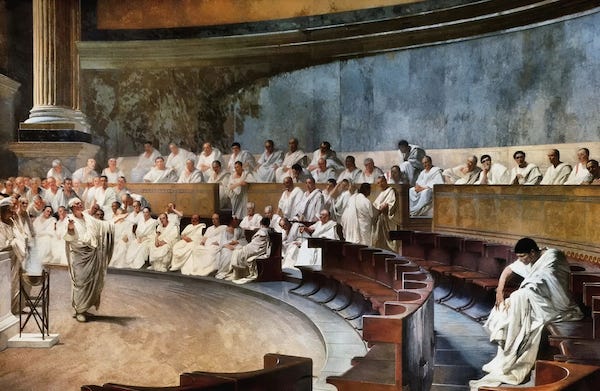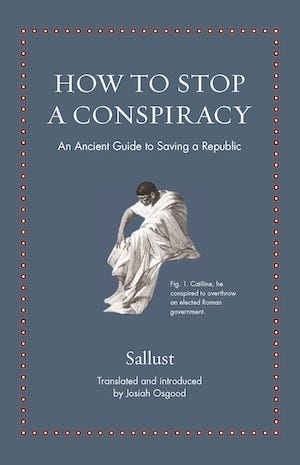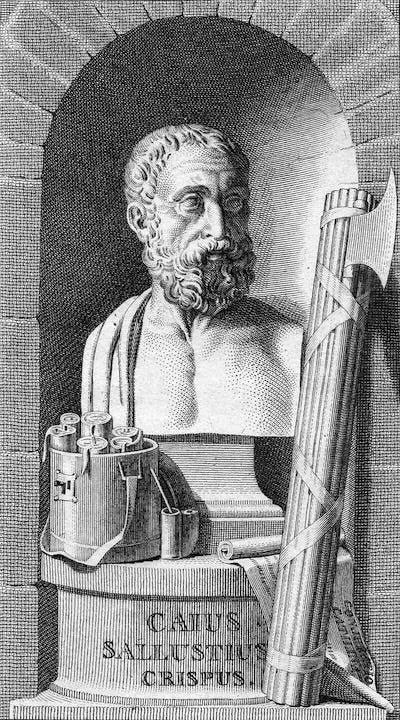How to stop a conspiracy with Sallust
Part XXIII of the Ancient Wisdom for Modern Readers series
[Based on How to Stop a Conspiracy: An Ancient Guide to Saving a Republic, by Sallust, translated by Josiah Osgood. Full book series here.]
If you need a strong endorsement to move you to read the ancient Roman historian Sallust, here is one:
“You go on, I presume, with your Latin Exercises: and I wish to hear of your beginning upon Sallust who is one of the most polished and perfect of the Roman Historians, every Period of whom, and I had almost said every Syllable and every Letter is worth Studying.”
So wrote John Adams to his son, John Quincy, back in 1781. It may seem an odd way to introduce the new edition of The War Against Catiline, which concerns itself with momentous events that unfolded in the year 63 BCE in Rome, but translator Josiah Osgood knows what he is doing. He points out that the Founding Fathers of the American Republic were very much concerned with conspiracy theories and worried about an impending overthrow of the government, what sociologist Richard Hofstadter later referred to as the “paranoid style” in American politics.
I do not have to point out the obvious to you: once again that paranoid style is very much on display right now, during the third decade of the 21st century. Of course, as Hofstadter himself remarked, there is nothing paranoid if one worries about actual conspiracies, so the question becomes one of separating the factual from the fictional, the real from the imaginary.
Enter Gaius Sallustius Crispus, better known as Sallust, who lived from 86 to 35 BCE and was personally involved in the Roman civil war that ended the Republic, fighting under the banner of Julius Caesar. In the late 40s BCE Sallust wrote De Coniuratione Catilinae (On the Catiline Conspiracy), also known as Bellum Catilinae (Catiline’s War), newly translated by Osgood for the ongoing Princeton Press series, Ancient Wisdom for Modern Readers.
Centering on the fascinating, if shadowy, figure of Lucius Sergius Catilina, Sallust’s book can be read as providing a warning for future generations about what happens when powerful people see politics primarily as a means to extend their own influence and prestige. Again, the parallels with currently unfolding events need not be spelled out.
Catiline came from one of Rome’s patrician families, which was now in decadence. He was determined to reverse the trend and to become Consul, the highest political office in Republican Rome. Before running for election in 64 BCE, Catiline had built a reputation for ruthlessness. After the previous civil war he had allied himself with the dictator Lucius Cornelius Sulla and had exploited his position to murder a number of rivals and confiscate their properties in order to begin to address the financially precarious family situation.
In 64 BCE there were, as usual, two slots for Consul, as the office—appointment to which lasted one year—was shared in order to minimize the chances that someone could achieve too much power, as it had happened in the case of Sulla. One of the two slots was won by Gaius Antonius, a friend of Catiline and a brutal fellow, with whom Catiline planned to share the benefits of supreme authority.
The surprise was that the second slot did not go to Catiline but to a “new man,” that is, someone who did not belong to the traditional Roman aristocracy and had become well known and influentials by the use of his intellect and wit: Marcus Tullius Cicero, the famous public advocate and later statesman and philosopher.
Catiline did not react well to the setback, but immediately started planning to run again the following year, 63 BCE. This time the stakes would be very high, since he was essentially bankrupt (then, as now, it was very costly to run a political campaign!). Just to make sure things would go his way in one fashion or another, Catiline also began to make plans to overthrow the government in case he were to loose a second time.
Perhaps not surprisingly, a major point of Catiline’s political platform was the cancellation of personal debt. That would have, in fact, helped a lot of Romans during that time, but of course it would have made a tremendous personal difference as well. As a result of his populist policies, Catiline began to gather a significant number of supporters, especially among financially destitute ex-soldiers. He organized this growing support into an unofficial army. A militia under his own control, we would say nowadays.
Cicero became aware of the conspiracy and launched a counter-conspiracy of sorts: he orchestrated a neutralizing plan behind the scenes, going so far as to entrap some of the conspirators by setting up a meeting under false pretenses with a group of Gauls that Catiline’s allies hoped to recruit to their cause.
The showdown between Cicero and Catiline took place at a meeting of the Senate on December 3, 63 BCE. Cicero accused his rival of conspiring against the legitimate Republican government, producing documents that incriminated Catiline and several others.

The principal co-conspirators were immediately put to death in a move that was borderline legal, but Catiline himself escaped and joined his army in northern Italy. He was eventually defeated by the Senate’s legions in an open battle at Pistoria on January 3, 62 BCE. Here is how Sallust describes the scene:
“When the battle was ended it became evident what boldness and resolution had pervaded Catiline’s army. For almost every man covered with his body, when life was gone, the position which he had taken when alive at the beginning of the conflict. A few, indeed, in the centre, whom the praetorian cohort had scattered, lay a little apart from the rest, but the wounds even of these were in front. But Catiline was found far in advance of his men amid a heap of slain foemen, still breathing slightly, and showing in his face the indomitable spirit which had animated him when alive.” (De Coniuratione Catilinae, 61)
Sallust himself experienced a remarkable series of ups and downs in his life. He was elected Tribune of the Plebes, one of the highest offices in Rome, but two years later he was expelled from the Senate. He joined Caesar’s side during the civil war that began in 49 BCE, but after the Ides of March of five years later, when Caesar was killed, Sallust retired from politics and began writing.
His chief inspiration was the Greek historian Thucydides, author of a history of the Peloponnesian War. Sallust sought to imitate Thucydides’s blunt and sometimes shocking language as well as his no-nonsense analytical approach to historical events. The point was to learn from history so not to repeat other people’s mistakes, though that seems to be something that human beings appear to be almost congenitally incapable of doing.
One of the questions that preoccupied Sallust, and which is still fascinating to contemplate today, is what caused the fall of the Roman Republic. Like Cicero, Sallust thought that the power of Rome wasn’t just a result of exceptional military might. It stemmed from the character of its leaders. But once Rome destroyed its chief rival in the Mediterranean, Carthage, things got too easy, and politicians turned to the pursuit of money and of power for its own sake, not for the good of the people. As Osgood puts it: “Values became perverted: poverty was now considered a disgrace, virtue a weakness, integrity a form of nastiness to others.” I will leave the reader to draw any additional parallel with the United States between the end of the Cold War and now.
Modern historians tend to deemphasize the role of individuals in shaping historical events, and rarely talk about character, if ever. They have, in part, a point. Catiline was able to go as far as he did because of the underlying political and economic situation in Rome, and so were Sulla and Caesar. Then again, history, at the end of the day, is the result of human actions, and it is to our own peril that we discount that factor.
Certainly the Founding Fathers of the American Republic did not need to be told who Catiline was, or to be reminded that character matters. Here is what Alexander Hamilton wrote to explain why he had come back to politics in 1800, finding himself in the odd position to help his former rival, Thomas Jefferson, against Aaron Burr:
“[Burr’s] private character is not defended by his most partial friends. He is bankrupt beyond redemption except by the plunder of his country. His public principles have no other spring or aim than his own aggrandizement. … If he can he will certainly disturb our institutions to secure himself permanent power and with it wealth. He is truly the Catiline of America.” (From How to Stop a Conspiracy, Introduction)
I wonder if we have any other Catiline walking amongst us right now, and how we will decide to face them the next time around.

[Next in this series: How to Be Healthy, by Galen. Previous installments: I, II, III, IV, V, VI, VII, VIII, IX, X, XI, XII, XIII, XIV, XV, XVI, XVII, XVIII, XIX, XX, XXI, XXII.]






"rarely talk about character, if ever."
Even as a very casual untrained history enthusiast, I can't say I blame them. While of course no conflict can be resolved if the individuals involved didn't have the will to participate, if I have to hear anymore arguments that patriotism and a commitment to "freedom" alone is what majorly decided the US's wars or any conflict really, or that the fanaticism of Axis forces meant "The Man in the High Castle" like situations were very plausible dangers with not even a casual understanding and regard of logistics and industry, I am going to need an extended outdoor hike.
As you said, history repeats itself and we rarely learn from it. The character of many of our world leaders today speaks just as loudly as their words. Since the end of WWII & the Cold War, many Western democracies assumed that trade would be enough to prevent war & that vigilantly guarding our Enlightenment values was not needed. Yet, here we are: "Like Cicero, Sallust thought that the power of Rome wasn’t just a result of exceptional military might. It stemmed from the character of its leaders. But once Rome destroyed its chief rival in the Mediterranean, Carthage, things got too easy, and politicians turned to the pursuit of money and of power for its own sake, not for the good of the people."